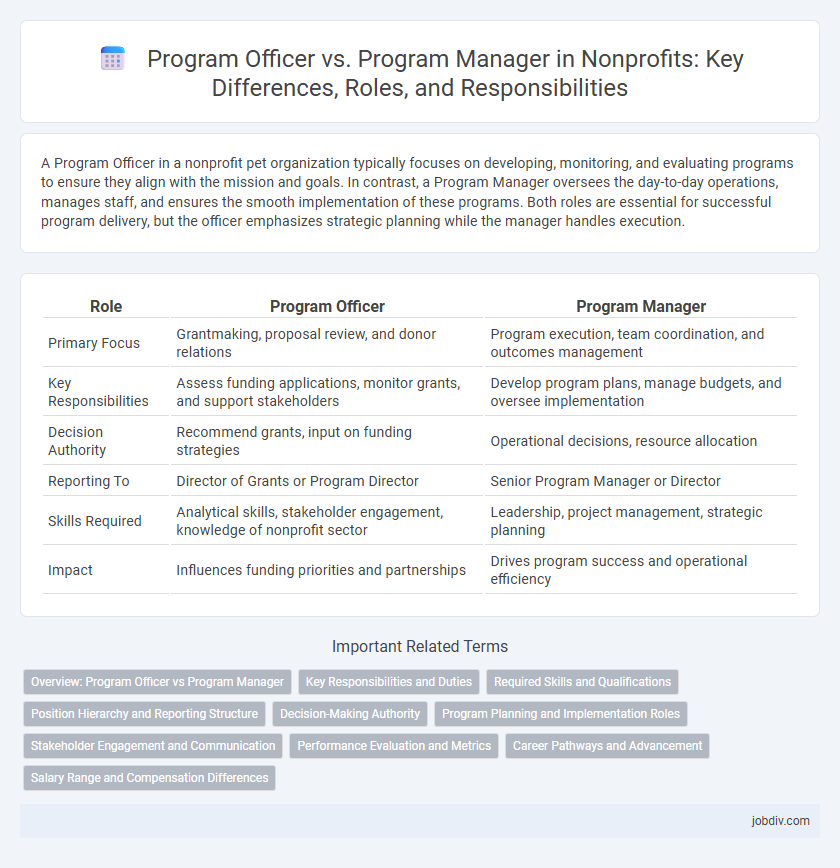A Program Officer in a nonprofit pet organization typically focuses on developing, monitoring, and evaluating programs to ensure they align with the mission and goals. In contrast, a Program Manager oversees the day-to-day operations, manages staff, and ensures the smooth implementation of these programs. Both roles are essential for successful program delivery, but the officer emphasizes strategic planning while the manager handles execution.
Table of Comparison
| Role | Program Officer | Program Manager |
|---|---|---|
| Primary Focus | Grantmaking, proposal review, and donor relations | Program execution, team coordination, and outcomes management |
| Key Responsibilities | Assess funding applications, monitor grants, and support stakeholders | Develop program plans, manage budgets, and oversee implementation |
| Decision Authority | Recommend grants, input on funding strategies | Operational decisions, resource allocation |
| Reporting To | Director of Grants or Program Director | Senior Program Manager or Director |
| Skills Required | Analytical skills, stakeholder engagement, knowledge of nonprofit sector | Leadership, project management, strategic planning |
| Impact | Influences funding priorities and partnerships | Drives program success and operational efficiency |
Overview: Program Officer vs Program Manager
A Program Officer in nonprofit organizations typically focuses on grant management, monitoring project compliance, and building relationships with partners to ensure program goals are met. In contrast, a Program Manager assumes a broader role overseeing the planning, implementation, and evaluation of programs, managing budgets, staff, and resources to drive strategic objectives. Both positions require strong coordination skills, but Program Managers hold greater responsibility for operational leadership and program outcomes.
Key Responsibilities and Duties
Program Officers in nonprofits primarily focus on grantmaking activities, including assessing funding proposals, managing donor relationships, and ensuring alignment with the organization's strategic goals. Program Managers oversee the execution and operational aspects of projects, such as coordinating teams, monitoring program progress, and evaluating outcomes to meet targeted objectives. Both roles require strong communication and analytical skills but differ in scope, with Program Officers concentrating on funding strategy and Program Managers on program implementation.
Required Skills and Qualifications
Program Officers require strong grant writing, donor relations, and analytical skills to effectively manage funding proposals and assess program impact, often holding a bachelor's degree in social sciences or nonprofit management with relevant experience. Program Managers need advanced leadership, project management, and strategic planning abilities to oversee program implementation, typically possessing a master's degree and several years of supervisory experience. Both roles demand excellent communication, budgeting acumen, and knowledge of fundraising regulations, but Program Managers emphasize operational oversight while Program Officers focus on program development and external partnership building.
Position Hierarchy and Reporting Structure
Program Officers in nonprofits typically report to Program Managers, reflecting a clear hierarchical structure where Program Managers oversee multiple projects or initiatives. Program Managers hold strategic responsibility, guiding Program Officers and coordinating program implementation to align with organizational goals. This reporting structure ensures efficient communication, accountability, and effective program delivery within the nonprofit sector.
Decision-Making Authority
Program Officers typically hold significant decision-making authority related to program design, funding allocations, and strategic priorities within a nonprofit organization, enabling them to shape program goals and partnerships. In contrast, Program Managers primarily focus on operational decision-making, overseeing day-to-day program implementation, staff coordination, and progress monitoring to ensure alignment with organizational objectives. The distinction in decision-making authority highlights the Program Officer's role in strategic planning versus the Program Manager's role in tactical execution.
Program Planning and Implementation Roles
Program Officers primarily focus on strategic program planning, including needs assessment, grant proposal development, and stakeholder engagement to align initiatives with organizational goals. Program Managers are responsible for the implementation phase, managing day-to-day operations, coordinating teams, monitoring progress, and ensuring program objectives are met on time and within budget. Both roles collaborate closely to ensure effective program delivery but differ in scope, with Program Officers emphasizing planning and Program Managers emphasizing execution.
Stakeholder Engagement and Communication
Program Officers in nonprofits primarily focus on designing and refining programs aligned with organizational goals, actively engaging stakeholders through targeted communication strategies to ensure program relevance and impact. Program Managers oversee the implementation and day-to-day operations of these programs, maintaining continuous dialogue with stakeholders to monitor progress and address concerns effectively. Both roles require strong communication skills to foster collaboration, but Program Officers emphasize strategic stakeholder engagement while Program Managers concentrate on operational communication and feedback loops.
Performance Evaluation and Metrics
Program Officers primarily focus on designing and overseeing nonprofit initiatives with an emphasis on setting strategic goals and evaluating overall program impact using qualitative and quantitative performance metrics. Program Managers implement these initiatives, managing day-to-day operations and tracking specific output indicators such as service delivery rates and participant engagement to ensure alignment with program objectives. Understanding the distinct roles in performance evaluation enhances accountability and drives data-informed decision-making within nonprofit organizations.
Career Pathways and Advancement
Program Officers in nonprofits typically focus on grant management, program evaluation, and strategic planning, serving as a critical link between funding sources and program implementation. Program Managers oversee day-to-day operations, staff coordination, and budget management, acting as leaders who ensure program goals are met efficiently. Career advancement often progresses from Program Officer roles, emphasizing analytical and funding skills, to Program Manager positions that require stronger leadership, operational expertise, and broader organizational impact.
Salary Range and Compensation Differences
Program Officers in nonprofits typically earn between $50,000 and $75,000 annually, focusing on grant management and program evaluation, while Program Managers command higher salaries ranging from $65,000 to $95,000 due to their broader responsibilities overseeing program implementation and staff supervision. Compensation differences reflect variations in experience, organizational size, and geographic location, with Program Managers often receiving additional benefits or bonuses tied to performance outcomes. Salary ranges also align with the complexity of duties, where Program Officers handle specific projects and Program Managers coordinate multiple programs and strategic planning.
Program Officer vs Program Manager Infographic

 jobdiv.com
jobdiv.com